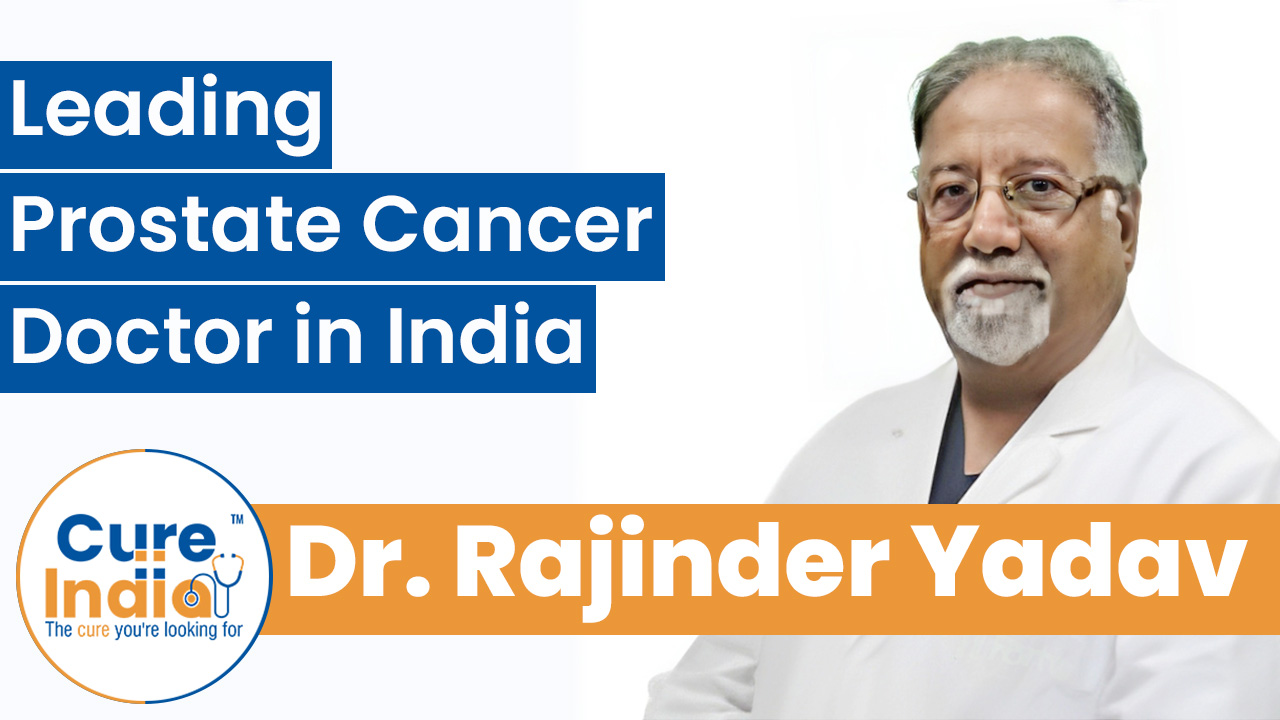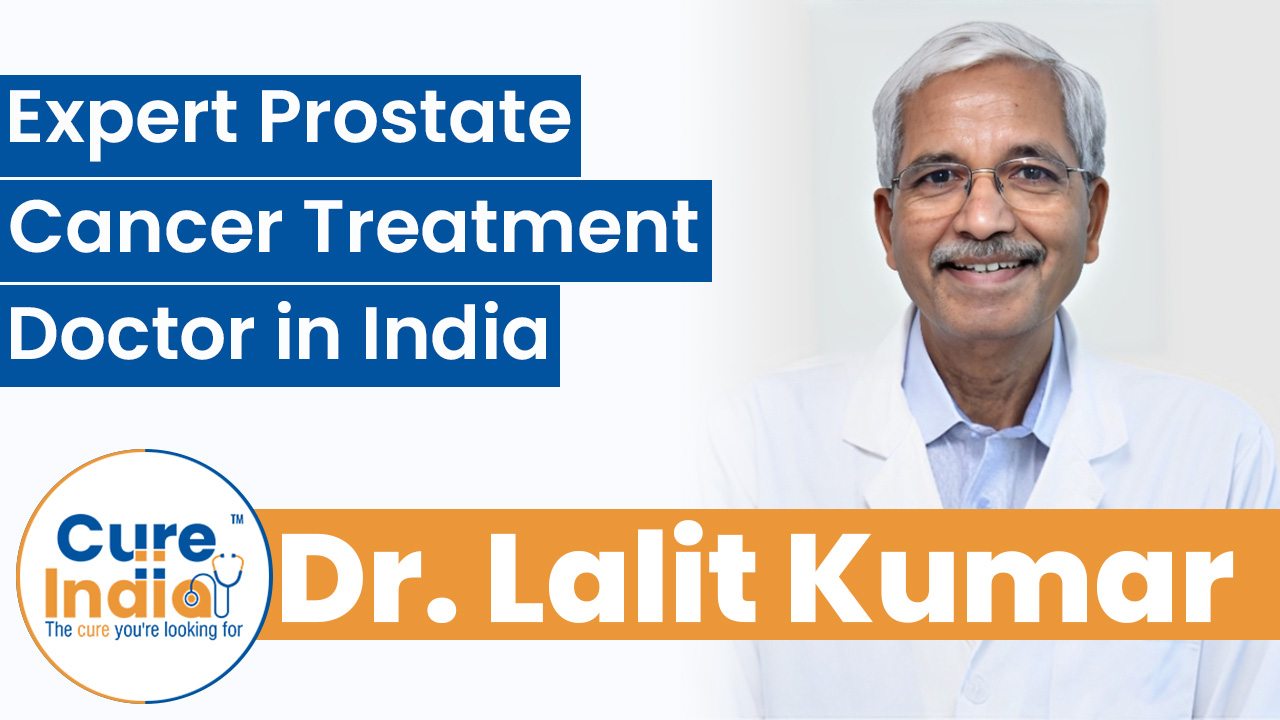

The prostate is a small, ping-pong-sized, walnut-shaped gland that is present in front of the rectum and below the urinary bladder. It is only present in males and absent in females. The function of the prostate gland is to produce a seminal fluid that transports and nourishes the sperm. Cancer refers to the abnormal growth of the cells and prostate cancer refers to the abnormal growth of the cells in the prostate gland.
The abnormal cell growth results in the formation of a group or a mass of these cells which is referred to as tumors. The tumors are of two types: cancerous (also known as malignant) and non-cancerous (also known as benign). The benign tumors do not spread to the other parts of the body and they are not harmful but the malignant tumors can spread to the nearby tissues and organs like the rectum, urinary bladder, etc. and they may cause life-threatening complications in the body.

Prostate cancer is the 3rd most commonly diagnosed cancer in the world. Studies show that African men are more prone to prostate cancer as compared to other nations. The prostate cancer rates and deaths caused by prostate cancer in men are high in Africa due to the unavailability of early diagnosis and proper treatments. For instance, prostate cancer is most common in Uganda with an incidence rate of 41.6% per 100,000 population.
According to the Uganda Cancer Institute, most of the prostate cases diagnosed were at stage IV. This is due to an insufficient cancer care system in the country. Other than Uganda, in many low and middle-income countries, prostate cancer is diagnosed at an advanced stage because of ineffective, and expensive treatment procedures. Because of this reason, many African men from countries like Uganda, Congo, Rwanda, and Ghana travel for prostate cancer treatment in India.
As prostate cancer treatment in India is reliable and far more affordable than in many other countries, they choose India over other nations. The Indian cancer hospitals provide innovative treatment options with the latest and modern infrastructure and facilities.
Oncologists in Indian hospitals for prostate cancer treatment have many many years of experience and can deliver the best treatment. The medical staff in the cancer institutes of India are highly collaborative and cooperative and provide 24-hour patient support. Africans have an extremely good experience with medical treatment in India and therefore trust getting their prostate cancer treatment in India.
The exact cause of prostate cancer in men is not known, but several DNA mutations damage cells and make them spread quickly, killing other healthy cells as well. There are factors that can trigger the growth of cancer cells in the prostate. They are:

Besides the above mentioned causes, there are some other factors that can cause prostate cancer. These include smoking, prostatitis, etc.
The early stage of prostate cancer in men usually does not show any symptoms. The symptoms of prostate cancer develop slowly as the disease slowly progresses. Any abnormality in a prostate gland will lead to the following symptoms.

Prostate cancer is identified at an early stage if the cancer cells are only present in the prostate and have not spread to the nearby tissues and if the cancer has spread to the nearby tissues, it is an advanced stage of prostate cancer. Depending upon the spread of the cancer cells, there are four prostate cancer stages:
These are considered early stages because the cancer is only in the prostate gland and has not spread to other parts of the body. It is also known as a localised prostate cancer stage. Prostate cancer is a slowly growing cancer and hence it does not quickly shift to the advanced stage of cancer.
It is also known as a locally advanced prostate cancer stage. When the cancer has spread a little bit to the nearby organs and tissues of the prostate, it is known as stage 3 prostate cancer.
It is known as an advanced stage of prostate cancer where the cancer has spread to the other organs and tissues of the body such as bones, liver, lungs, lymph nodes, etc. Advanced prostate cancer can also spread the cancer to the rectum, pelvic wall, and rectum.
There are many types of prostate cancer. The most common form of prostate cancer is adenocarcinoma, about 95% of people diagnosed with prostate cancer have this type. Depending on which cell has developed cancer, you may have one of these types of prostate cancer:

It is a male prostate cancer that forms in the cells of a prostate gland. These cells of the prostate gland produce the fluid that mixes with the sperm to make semen. If these cells become cancerous it is known as adenocarcinoma. There are two types of Adenocarcinoma prostate cancer.
This is the type that most people are diagnosed with. When the cancer forms in the cells that form the lining of the prostate gland it is known as acinar adenocarcinoma.
This is an aggressive form of male prostate cancer that occurs in the cells that form the lining of the ducts present in the prostate gland. It grows rapidly and spreads fast.
It is also known as urothelial carcinoma. This type of prostate cancer in men starts from the cells that form the lining of the urethra (the tube/pipe that excretes the urine). This type of cancer starts from the urinary bladder and then spreads to the prostate gland and in very rare cases it starts from the prostate gland and spreads to the urethra and surrounding tissues. It is very rare and only 2 to 4% of people diagnosed with prostate cancer have this type.
It is actually a skin cancer that starts from the prostate gland and then spreads to the skin. Only about 1% of people are diagnosed with this type of prostate cancer.
It is also known as neuroendocrine cancer. It grows faster than other types but is only diagnosed in about 1% of patients. This type of prostate cancer starts in the prostate gland and then spreads to the lungs. It may also spread to the other organs in the body such as the liver, bones, etc. if early diagnosis is not done.
Neuroendocrine cells are the ones that make the hormones in the organs these cells are present in such as the pancreas, lungs, stomach, etc. Neuroendocrine prostate cancer starts in the digestive tract and then spreads to other organs. It rarely spreads in the prostate gland. Less than 1% of people are diagnosed with this cancer.
This type of cancer starts from the supportive and connective tissues such as blood vessels, nerves, muscles, fat, etc., and then spreads to the different body organs. It very rarely spreads to the prostate gland. It affects less than 1% of men.
When you consult your doctor for the prostate-related symptoms you are having, and if the doctor thinks that it may be due to male prostate cancer then he may conduct the diagnostic tests to confirm the condition. The diagnosis of prostate cancer is done in 3 steps: first, the presence of male prostate cancer is diagnosed, then whether the prostate cancer is aggressive or not is checked, and then whether it has spread to other body parts is checked. The different diagnostic steps for prostate cancer are mentioned below in detail:
To check the presence of male prostate cancer, your doctor will first conduct a physical examination and blood test, and then depending on the test result, further tests will be done. The diagnostic tests to determine if you have prostate cancer include:
■ Digital rectal exam (DRE): As the prostate gland is present in front of the rectum, we can examine the prostate gland through the rectum. For this, the doctor wears a glove, applies lubrication on the gloved finger, and inserts it into the patient’s rectum to check any abnormal shape, size, and texture of the prostate gland.
■ Prostate-specific antigen test (PSA): It is a blood test to determine any infection or inflammation in the prostate gland that may be due to cancer. In this test, the patient’s blood is analyzed for the presence of PSA. The PSA is normally present in the blood but it is in normal amounts. However, if the prostate is diseased, it produces a high amount of PSA.
■ Ultrasound test: This is an imaging test that uses sound waves to create an image of the organ under examination. In this test, an ultrasound probe is inserted into the rectum and the prostate gland’s image will be visible on the screen to check for any abnormalities.
■ Magnetic resonance imaging (MRI): By using an MRI scan, we can get a more detailed image of the prostate gland.
■ Prostate biopsy: To determine the presence of cancer cells, a biopsy is done where the tissue of the prostate gland is collected with a thin needle and sent to the lab for testing.
When the above mentioned tests confirm the presence of prostate cancer in men, the next step is to check how aggressive (grade) your cancer is. Following are the tests to check that.
■ Gleason score: It is a common test to determine the grade of prostate cancer. Based on the biopsy results, there are different grades of cells present in the cancer tissue, the most common grades are combined and the Gleason score. A score of 6 means low grade, 7 means medium grade, and 8 to 10 means high grade cancer.
■ Genomic testing: This test is not always performed, but it is a great tool to decide the treatment option. It is a test that determines the mutations in the genes of the prostate cells.
Once the grade of male prostate cancer is determined, the final diagnostic step is to determine whether it has spread to other organs in the body. For this, the list of tests that your doctor might perform is given below:

Treatment for prostate cancer necessitates specialised knowledge and skills from experienced uro-oncologists. CureIndia helps you find the best prostate cancer specialists in India for your treatment. The prostate cancer specialists in India have years of experience and the necessary expertise for the right prostate cancer treatment plan. Let us hear from some of the leading prostate cancer specialists in India.

Dr. Archit Pandit is one of the leading Surgical Oncologists of the country for prostate cancer. His focussed areas of expertise include, GI, Gynaecological & Breast Cancer, Laparoscopic Cancer Surgeries, Gastro-Esophageal Cancer, Robotic Cancer Surgeries, Urological cancers and Head & Neck Cancer, to mention a few.


Dr. Lalit Kumar is the top bone marrow surgeon in Delhi with 25 years of experience in the field of hemato-oncology and BMT. At present, he is the chairperson and oncologist hematologist in Artemis Hospital, Gurgaon, and New Delhi. He offers years of experience and intense knowledge in both his national and international career illustration.

The total cost of prostate cancer treatment is influenced by many different factors such as the stage and severity of cancer, type of treatment planned, pre and post-treatment consultation, medication cost, travel cost, oncologist’s fees, hospital fees, overall health of the patient, diagnostic test cost, insurance coverage, etc. Considering these factors, the prostate cancer treatment in India may cost you around $4,807 to $7,211.
The prostate cancer treatment is India is far more affordable compared to many developed countries. For a better understanding, let’s compare the cost of prostate cancer treatment in India with the developed countries; like the USA and the UK.
| Treatment | Cost in India | Stay in India |
|---|---|---|
| Radical Prostatectomy Prostate Cancer Treatment in India | $5,000 - $6,000 | 3-4 Weeks |
| Chemotherapy for Prostate Cancer Treatment in India | $1,000 per cycle | 3-4 Weeks |
It is evident from the cost compared above that the cost of prostate cancer treatment is too low and affordable in India than in other countries. Although India is a developing country, the medical staff and the hospitals in India provide top-notch medical treatment with the highest success rate and successful medical procedures. Under the treatment cost of prostate cancer in the USA and UK, you can cover the total cost including the travel, stay, medicine, and treatment costs in India. Hence, the prostate cancer itreatment n India is much more affordable and profitable for international patients.
There are numerous prostate cancer treatment options in India. Depending upon the grade and type of prostate cancer you have, the best management and treatment options will be recommended to you by your doctor. Your doctor may use a combination of the different treatments to treat your prostate cancer. The different prostate cancer treatment options in India are as follows:

■ Watchful waiting: This is an approach that is used for patients who have critical illnesses in the body and are not expected to live more than 5 years. For these patients, regular PSA tests and biopsies are not done and the treatment is only done if the patient suffers from pain and blockage in the urinary tract.
■ Active Surveillance: This is similar to the watchful waiting approach, the only difference is that the patients will have scans, and biopsies once or twice a year to monitor the growth of cancer. This approach is used when you don’t have any symptoms of prostate cancer and the cancer is growing very slowly.
■ Radiation Therapy: This prostate cancer treatment option includes the use of radiation to kill and destroy the cancer cells present in the prostate. This method is proven to be one of the most effective treatments for advanced and localised cancer. There are different types of radiation therapy such as External Beam Radiation Therapy (EBRT) and Brachytherapy.
■ Hormone Therapy: Surgeons mostly used the hormone therapy in combination with the radiation therapy for treating prostate cancer. Hormone therapy is used to control cancerous cell growth. It includes stopping your body from producing testosterone hormone by injections, medicines (tablets), or sometimes a combination of both. Sometimes, the testis are surgically removed from the body as testis are where the testosterone is produced.
■ Chemotherapy: This prostate cancer treatment option is used when the prostate cancer has spread to other parts/organs of the body, also known as metastatic prostate cancer). The chemotherapy involves use of medicines that will destroy the cancer cells. Sometimes chemotherapy and hormone therapy are used in combination. Your doctor may use a taxane chemotherapy or a platinum chemotherapy.
■ Immunotherapy: One approach to treat cancer is to re-train the immune cells of our body’s immune system to respond to abnormal functioning of the cancer cells. By this, our body’s immune system will kill the infected and cancer cells that are harming the body. The immunotherapy includes sipuleucel-T immunotherapy and Pembrolizumab.
■ Targeted Therapy: This therapy is used to treat recurrent and advanced prostate cancer when the hormone therapy is not showing any results. Targeted therapy involves using medicines that identify the mutations (genetic component) of the cancer cells and tumors and destroy them.
■ Focal Therapy: This is a new approach to prostate cancer treatment which destroys the tumor that has formed in the prostate gland. The focal therapy includes:
■ Surgery: The prostate cancer surgery is done to remove the prostate gland from the body. It is known as prostatectomy. The different types of prostatectomy surgery are listed below.
The prostatectomy surgery can be done by using different techniques such as: -
■ Laser Prostatectomy: It is a method used for enlarged prostate treatment. In this method, the surgeon inserts a scope from the urethra and a laser light is passed through the scope which targets the tumor and shrinks it. After that, the tumor tissue is removed.
■ Laparoscopic Prostatectomy: It is a procedure that involves making small incisions on the lower abdomen and inserting a laparoscope from one incision and surgical tools from other incisions and the surgeon performing the surgery by looking at a TV monitor. A laparoscope has a tiny camera and a light that shows the live video on a TV screen as the surgeon performs the surgery.
■ Robotic Prostatectomy: It is the most widely used advanced technique to perform prostatectomy surgery in which the surgeon uses a robotic arm to perform the surgery. In this procedure, the surgeon sits on a console that has a remote control. The surgeon controls the robotic arms while sitting at a little distance from the patient by looking at a 3D and magnified view of the internal organs. This approach is very beneficial as it makes an even smaller incision and performs the surgery with great precision.
■ Open Prostatectomy: In this prostatectomy procedure, the surgeon first inserts a Foley Catheter from the tip of the penis through the urethra into the urinary bladder to drain out the urine. Then, your surgeon will make one large incision on the lower abdomen or right above the pelvic bone and perform the surgery. Your surgeon will then disconnect the prostate gland from the blood vessels and surrounding tissues and then either remove the entire prostate gland or only the problematic parts. The incision site will be then closed with the stitches.
After your prostate cancer treatment is over, you will be taken to the recovery room and monitored until the anesthesia wears off and you wake up. When you wake up, you will find that you will have some tubes and drains, these include a drip that is attached to give you fluids and medicines such as patient-controlled analgesia (PCA) through the vein in your arm, a drain that drains any fluid or blood released at the surgical site, a urinary catheter to drain the urine, and an oxygen mask.
You might feel drowsy due to the effect of anesthesia. You will need to spend about 1 to 2 days in the hospital. You might have some temporary symptoms like constipation, erectile dysfunction, etc. However, these are temporary and will be cured as you heal. The total recovery period after prostate cancer surgery may take about 4 to 6 weeks.
For the management of pain and discomfort, your doctor will prescribe pain medications to you. In most cases, the surgeon uses dissolvable stitches (to close the incision) that dissolve into the body over time. If the non-dissolvable stitches are used, you will be given a follow-up appointment usually after 7 to 10 days to remove the stitches.
When you are discharged from the hospital, your surgeon will give you some instructions to follow which include decreasing the sitting time, taking frequent walks around the house or outside, etc. You can return to work and regular activities within a month, with proper rest and healthy lifestyle habits.
Prostate cancer is common in men especially the men of African origin. With an increase in the prostate cancer cases every year, the proper diagnosis and treatment options are insufficient in many low-middle income countries due to which many people especially from Africa travel to India for prostate cancer treatment due to low cost and supreme medical service in Indian cancer hospitals. The skilled prostate cancer doctors in Indian hospitals are globally trained and have undergone training in international institutes. The Indian hospitals bring in new innovative treatment approaches and technology in order to provide sufficient and optimal treatment options. Due to this reason, a lot of African men trust Indian Cancer Hospitals and visit India for their enlarged prostate treatment.
